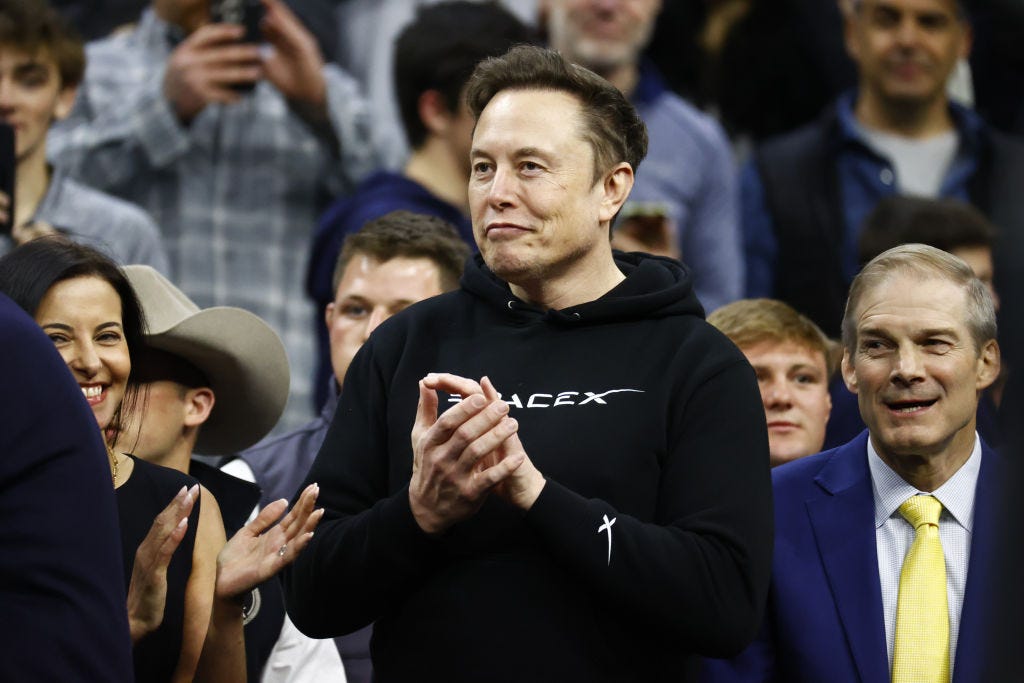“People who have kids do need to have 3 kids to make up for those who have 0 or 1 kid or [the] population will collapse,” Elon Musk recently wrote on X, in response to a post by the influencer Mario Nawfal warning that “if things continue as they are, humans have their days numbered.”
This is increasingly the tenor of the right-wing discourse around declining birth rates: it is not enough to feel serious concern about the consequences of fewer humans coming into existence—about schools and colleges shuttering, about pensions running out of funds, about the intangible loss that comes with fewer children, fewer siblings, fewer friends, fewer souls. No, a certain subset of right-coded natalists now claims that declining fertility rates will lead to total human extinction—and that nothing short of pumping out legions of babies as fast as possible will save the species. There is little mention of family planning or prudence.
The spectrum of personalities pushing this attitude stretches from socially libertarian Elon Musk—with his harem of IVF baby mommas—to socially conservative tradwives and tradhusbands and policymakers. But they are often united by a hubris and hopelessness that sounds surprisingly similar to the howling of the Greta Thunberg crowd. Both the natalists and the climate alarmists increasingly speak fatalistic pronouncements about a future they actually can’t know that much about.
At least Thunberg’s disciples have the decency to be proper atheists. They can be forgiven for their doom-and-gloom prophecies of Exxon fire and brimstone broiling humanity to extinction, given that they believe that this plane is all there is to existence, that humans alone can and must save the earth from a human-created hell engulfing it; they don’t believe in any other saviors.
Natalists, however, often have no such excuse, and in fact deploy religion to advance the cause—but they do so in a way that is all too often exploitative, utilitarian and antithetical to faith. That’s not to say all natalists speak in this way: some, such as Catherine Ruth Pakaluk, a professor of economics at Catholic University and mother of eight, appeal to the beauty of family and acknowledge the role of divine providence when it comes to bringing life into the world. But more often, the broader movement—especially as it has become inextricable from “based” online right-wing culture—shouts over these measured voices, even as it exploits faith.
Indeed, the problem of low birth rates sits conveniently at the intersection of a growing list of red-pill-driven grievances against working women and secular liberal culture more broadly. At the first Natal Conference in 2023, Charles Haywood told an audience largely composed of men that women “should be socially stigmatized if they have careers.” Jack Posobiec at this year’s NatalCon was even more to-the-point: “Our enemies want us dead,” he said, referring to “the Luigis, the Tesla terrorists, the woke, the globalists, the nihilists.” Natalists should therefore have kids to staff a counterinsurgency. The writer Peachy Keenan, who is Catholic, mentioned at the same conference the high rate of marriage at Christian colleges relative to Harvard and ended her speech by talking about how there is a “small army of trad kids… on the way” to raise the birth rates. It’s strange: many prominent natalists seem happy to appeal to religion insofar as it commands the faithful to make babies early and often and yet seem to reject the key humility that religion commands, its reminder that there are things beyond human control and understanding, human existence chief among them.
Certainly, humanity can do things to help itself. Incremental policy change can help ease the economic burden on families, and nudging young newlyweds into taking the next leap is a tale as old as time. But natalists go well beyond this and politicize the family while arrogantly prognosticating on the future.
We can’t possibly know exactly how birth trends will shake out. After all, the population-control advocate Paul Ehrlich predicted in The Population Bomb (1968) that in 1970s and ’80s “hundreds of millions of people will starve to death in spite of any crash programs embarked upon now.” No such famine happened, of course, but his scaremongering about a world with too many people should raise the question: why would we presume that the most extreme natalist forecasts about a world with too few people will age any better? Maybe it’s uncomfortable to admit that life and death are beyond our control, but it’s better than the alternative of looking at our humanity as a spreadsheet.
Turning what is perhaps life’s greatest, most awe-inspiring mystery—who we are, and how we have come to be—into a line on a chart that we’re supposed to panic over is, in addition to being almost comically depressing and grey, so utterly hubristic, not to mention grating (and, at this point, cliché). It is also counterproductive: desacralizing human existence this way convinces precisely no one outside of the terminally online to have children, turning sex and pregnancy and childrearing into public services more akin to doing one’s taxes than to expressions of love beyond comprehension.
Toward the end of John Milton’s Paradise Lost, Eve suggests to Adam that they simply not reproduce and instead “seek death” so that the curse can begin and end with them. It’s a clever idea, if we’re being honest, but Adam shuts her down. They would be deprived of the opportunity not only to serve God, he says, but “to crush [the serpent’s] head,” which “would be revenge indeed.” “Willful barrenness,” he adds, “…cuts us off from hope.”
Milton is right: Hope, more than anything else, is the real (and maybe only) case for more babies. Pity that many of the people who advocate the most for “raising the fertility rate” seem to lack it so.
Elon Musk and Greta Thunberg: strange bedfellows
Natalists and climate alarmists are starting to sound alike

Greta Thunberg is arrested by police officers outside of the Swedish parliament, March 15, 2024. (Getty)
“People who have kids do need to have 3 kids to make up for those who have 0 or 1 kid or [the] population will collapse,” Elon Musk recently wrote on X, in response to a post by the influencer Mario Nawfal warning that “if things continue as they are, humans have their days numbered.” This is increasingly the tenor of the right-wing discourse around declining birth rates: it is not enough to feel serious concern about the consequences of fewer humans coming into existence—about schools and colleges shuttering, about pensions running out of funds,…

























Leave a Reply